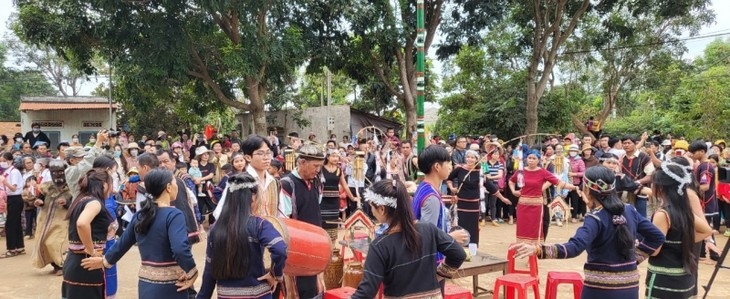Families in the Kon H’ring Hamlet begin their New Year’s Day celebrations by cooking in the early morning hours. As part of their worship offerings, they prepare glutinous rice in bamboo tubes, liquor in vases, pork, chicken, rat meat, and a delectable bitter tomato soup.
For the New Rice ceremony, H’Veu, who cooks for the event, explains: “We make glutinous rice in bamboo tubes and fry sour young bamboo shoots with pork. Banana trees are sliced, mixed with rat meat, and then grilled. I will bring the food to the communal house, where all the villagers will enjoy the meal together.”
Rat meat is an essential dish served to the Gods during the New Rice Festival. The Xe Dang people believe that rats can cause detrimental damage to their crops, so they capture and sacrifice them to the Gods in order to ward off further destruction.
A Quan, who traps rats in the forest and in terraced fields, states, “I often leave my home at midnight and return at 7 or 8 a.m. I set up around 50 traps during that time.”
Vi Von, head of Kon H’ring hamlet, remembers the time when the Xe Dang people lived in Kon Tum province. Unfortunately, due to wars, they had to migrate to Dak Lak province in 1988.
In the past, the Xe Dang people used to celebrate the New Rice Festival amongst their families or with their neighbors from October to December. Since 1994, however, the festival has evolved into a much larger community event. Every family prepares a variety of food and brings it to the communal house, where they come together to enjoy the festivities.
We celebrate the New Rice Festival on the first day of the year to mark the completion of the rice and coffee harvesting season. It’s an occasion for us to come together and share our joy, discuss our production and experiences, and strengthen our community bond. Von explains.

When they hear the gongs’ melodious tolls, people assemble in the courtyard of the Kon Hring communal house to participate in the ritual. Amid a reverent atmosphere, the elderly villagers lift up the offerings, offer prayers to Heaven and Earth, and beseech the gods and ancestors to grace the ceremony. They implore for a bountiful harvest in the coming year.
We earnestly pray that next year, the growth of rice will be as vigorous and magnificent as the grass in the forest and the sugarcane in the garden. Everyone passing by desires to request for rice seed. We implore for favorable weather, healthy individuals, a joyous family, and the children’s excellent learning,” says Von.
After the traditional ritual, people celebrate the New Year by pouring liquor into vases through bamboo tubes, dancing, singing, and playing folk games. The festive atmosphere brings villagers and guests together in joy and merriment.
The villagers and guests came together to celebrate the joy of a plentiful harvest and look forward to a prosperous New Year by dancing and sharing in the happiness.




